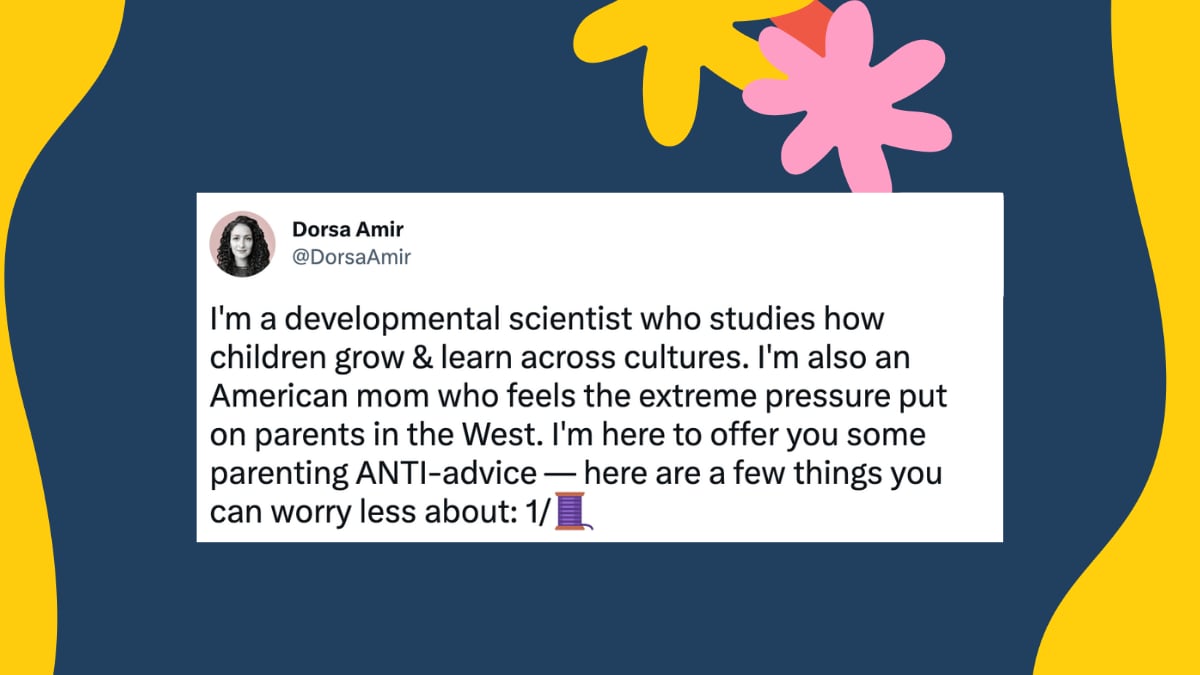Do you ever wish you had access to a child development expert who could drop in and let you know if you’re doing a good job? Well, thanks to the Internet, you sort of do. Dr. Dorsa Amir is a developmental scientist who studies how kids learn and grow across different cultures, and she recently took to Twitter to drop some seriously helpful advice for parents and caregivers based on everything she’s learned.
In a thread that’s been retweeted nearly 4,000 times, Dr. Amir shared her best parenting “anti-advice”: facts about raising kids that maybe aren’t covered in the parenting books or might even be a little different from the usual societal expectations placed on parents in the U.S.
“I wrote the thread because, as a mom to a 2-year-old, I was personally feeling a lot of stress and pressure, even though my entire career is focused on child development,” Amir says. “The pressure to be a perfect parent is so overwhelming that I have to actively and constantly remind myself that I don’t have to succumb to it, and that’s essentially what the thread was.”
Amir’s advice was an instant hit with parents and quickly went viral. Ultimately, she let parents know it’s OK to be imperfect, check your expectations and even do a little bit less. Here are 5 key takeaways from her advice:
1. Not everything needs to be educational
“It’s truly completely okay (and, indeed, good) for kids to play for the sake of play. They don’t have to be learning the alphabet or animal noises. They can just do whatever silly thing they want to do. They are always learning,” Amir writes.
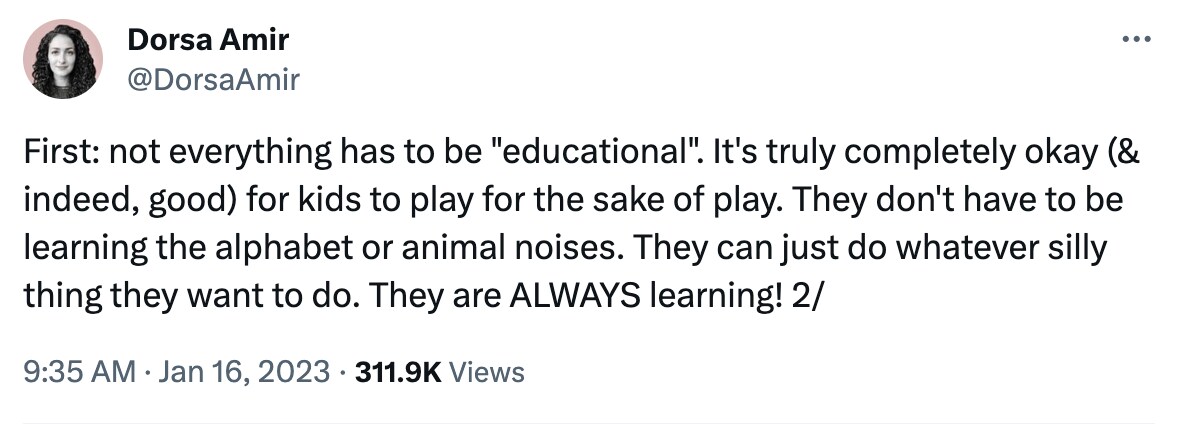
This not only means that you can breathe easy if your kid’s favorite TV show isn’t solely educational. It also means parents can relax and enjoy the moment once in a while, instead of feeling the need to turn every activity into some kind of “lesson” or skill development opportunity.
“Active and direct instruction from an adult is the rarest form of teaching in human history,” she adds. “Kids know how to learn in other ways—like observation—and they’re extremely good at it. For instance, I went to a little indoor gym class with my toddler, and the teacher held up a ball and moved it around so the kids could ‘learn how to track objects with their eyes.’ I cannot stress enough how completely and utterly unnecessary that is. You do not need to teach that.”
2. It’s OK to be boring
Not only is it OK for kids to be bored, Amir says, but parents also shouldn’t be afraid to just be their usual, sometimes not very fun selves. “You do not have to be your child’s zany, cartoonish friend. You can just be their boring parent, if you wish,” she explains. “This thing we do in the West, where we pretend to be kids to play with our kids? That’s super unusual, to be honest, and you do not have to feel obligated to do it.”
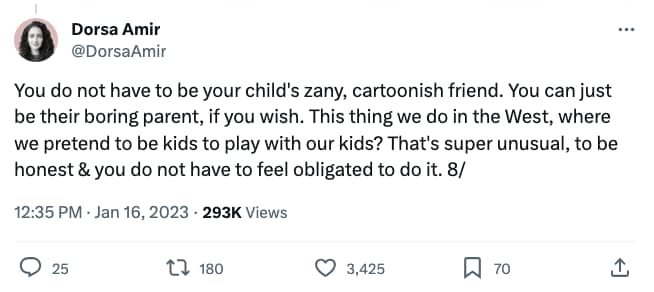
Your kids’ toy stash doesn’t have to be wild either. “You don’t have to buy your children 600 toys,” she says. “You shouldn’t feel guilty if you do, but you shouldn’t feel guilty if you don’t. Kids can play with literally whatever. They have a particular fondness for adult-utilized objects, actually. Those function as play objects just fine.”
3. Let kids experience conflict
A childhood that’s carefree and completely devoid of emotional challenges is “not the goal,” Amir says. Instead, you should aim for nuance: Protect kids, but also let them experience conflict and big emotions and help them navigate it.
“Kids should be allowed to experience social conflict. They can disagree or argue with their playmates; that’s completely fine and actually very good for them to practice,” she says. “Let them resolve things if they can. You don’t have to get involved or prevent it from happening. More generally, negative emotions are not bad, and it’s good for kids to experience what they feel like and learn how to process them.”
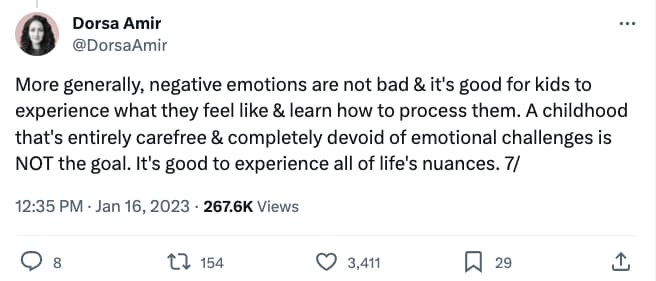
4. Everything doesn’t have to be kid-centric
Your entire life, home and schedule doesn’t have to revolve around you kids in order for them to be happy. According to Amir, kids do just as well tagging along to the grocery store or helping around the house. And they don’t need special activities or special toys and supplies in order to engage in learning, developing and growing.
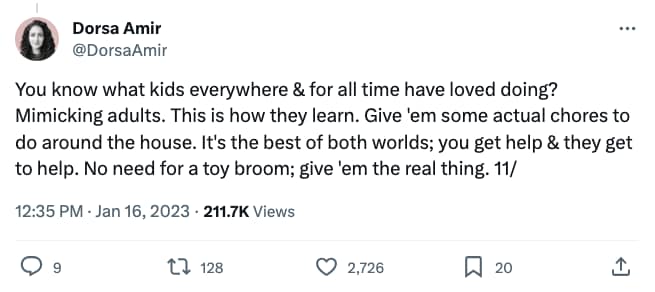
“You know what kids everywhere and for all time have loved doing? Mimicking adults,” she adds. “This is how they learn. Give ’em some actual chores to do around the house. It’s the best of both worlds; you get help and they get to help. No need for a toy broom; give ’em the real thing.”
5. Be flexible and give yourself grace
With all the arguing we do about parenting online, it may be tempting to think there’s a “right” way to do it. In reality, Amir says, there are a lot of ways to be a successful parent, and you don’t have to try to force yourself into a particular mold.
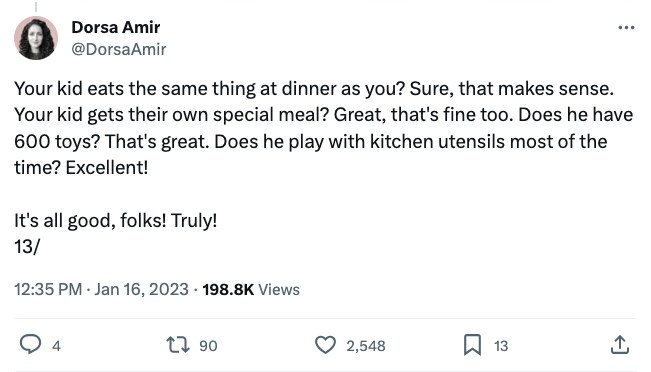
“One thing that makes humans extra special is high levels of what we call ‘plasticity,’ or the ability to calibrate to a million different ecological, cultural and social environments. What this means is that there are a million different ways to be human, and they’re all valid,” she explains. “Your kid eats the same thing at dinner as you? Sure, that makes sense. Your kid gets their own special meal? Great, that’s fine, too. Does he have 600 toys? That’s great. Does he play with kitchen utensils most of the time? Excellent. It’s all good, folks! Truly!”
